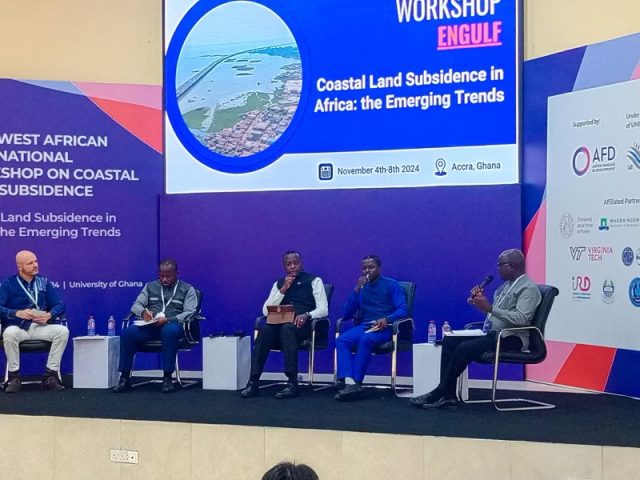By Isaac Asare
Panelists at the just-ended Workshop on Coastal Land Subsidence held in Accra are requesting government to commit adequate funding to address the growing threat posed by excessive groundwater extraction.
According to them, human activities such as sand winning, salt mining, petroleum exploration, and the continuous drawing of water from underground aquifers have exposed the vulnerability of the West African coast to various hazards resulting in relative sea level rise, flooding, erosion, and pollution.
However, data and regulation on groundwater depletion is lacking, whereas investment in the promotion of sustainable groundwater management is on the low. The maiden West African International under the ENGULF Research Project, funded by the French Development Agency (AFD) has the University of Ghana UG, as one of its implementing partners. It was on the theme: “Coastal Land Subsidence in Africa: the emerging Trend”
Unregulated groundwater extraction has been a looming environmental crisis threatening coastal communities in Ghana, particularly the Volta Region. Aside from the growing impact of climate change, excessive groundwater extraction has become one of the major drivers of coastal land subsidence. Although some progress have been made in expanding access to water services in Ghana, a section of the population for obvious reasons still resort to groundwater extraction by drilling boreholes and dugouts. The practice is becoming increasingly depleted due to excessive pumping.
According to Selasie Yao Avornyo of the Department of Marine and Fisheries at the University of Ghana, the phenomenon of coastal land subsidence is alarming in coastal regions and areas vulnerable to flooding and erosion. This, he noted, is evident in cracks and sinking of buildings including road networks. Providing some insight into the worrying phenomenon, Dr Avornyo gave a simple analogy to the effect that when you take too much water from the ground than the rate at which is being replenished, you lower the water table.
“The water table acts as some sort of a balloon over which the land lays. So if one deflates a balloon, the balloon shrinks, and so does the land above it. So when you take too much water, pore pressure decreases, and so does the land above it, resulting in compaction and otherwise land subsidence.” For him, sustainable groundwater extraction is the way to go. “Groundwater extraction must be done sustainably. Ideally, we need data sets, hydro-geological data sets, to know how much water we have down there, how much has been extracted on a daily, annual, or quarterly basis, how much water is replenished seasonally, so that we find equilibrium in terms of extraction and replenishment and to maintain some sort of sustainable use of it. In other words, we can’t live without groundwater,” he added.
Emphasizing the economic potential of coastal nations, a geospatial expert and Project Investigator of the ENGULF Project, Prof Kwasi Appeaning Addo revealed that Ghana is recording millimeters of land subsidence around coastal communities. Subsidence is a gradual caving in an area of land mostly caused by groundwater extraction, and if not controlled, will lead to sinking of land, should the recording get into centimeters. While advocating for regulations when it comes to underground water extraction by public institutions and the public, Prof. Appeaning Addo urged stakeholders to heighten awareness on the effects of increased groundwater extraction. He again touched on the need for accurate and up-to-date data, including satellite imagery and ground-based measurements, to assess coastal changes.
During a panel discussion, Dean of the International Relations office of the University of Energy and Natural Resources, Prof Amos Kabobah, proposed a more integrated approach to water resource management and challenged government to support the cause by way of funding and resource allocation. From the discussions, it was obvious that sustainable groundwater management practice is key to dealing with the challenge. This includes monitoring groundwater levels, implementing water conservation measures, and exploring alternative water sources.
In an interview with GBC NEWS, the Provost, College of Basic and Applied Sciences, University of Ghana, Prof. Sandow Mark Yidana, said apart from extraction of groundwater used for domestic use and agriculture use, salant groundwater for salt mining is also a major threat to subsidence when it comes to the stability of the coast. He also called for strict regulations on the phenomenon to save the ecosystem. The 4-day workshop which brought together experts from across West Africa witnessed the unveiling of the Global Navigation Satellite System antenna and receiver installed at the Department of Marine and Fisheries Sciences.
This technology has become indispensable for coastal research as it provides accurate, long-term data that supports a wide range of scientific and practical solutions. According to a Senior Lecturer at the Department of Marine and Fisheries Sciences, Dr Benjamin Osei Botwe, the installation of the GNSS antenna and receiver at the facility is more than a tool because it does not only symbolizes the department’s shared vision for sustainable coastal resilience but will help elevate their research capabilities and play an important role in monitoring coastal land subsidence and geographical changes backed by data.
















